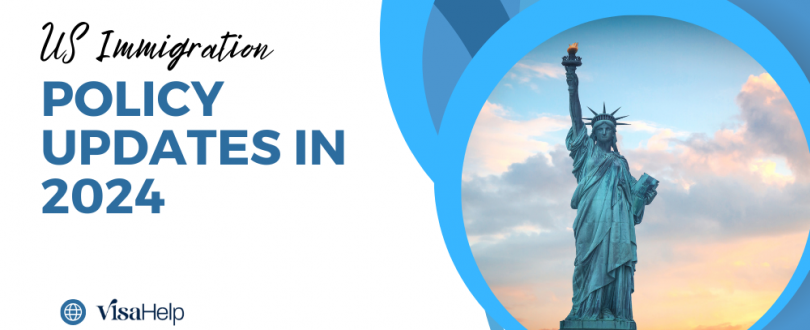
2024 US Immigration Updates: Understanding Key Policy and Visa Changes
Navigating the complexities of US immigration can often feel like walking a tightrope, especially with the ever-evolving landscape of policies and regulations. As we step into 2024, travelers, immigrants, and businesses need to stay informed about the key policy updates that could impact their plans and lives. Let’s delve into these significant changes and understand their implications.
2024 Immigration Policy Changes
The year 2024 marks a significant turning point in the landscape of US immigration. Policy changes introduced this year reflect a blend of new governmental priorities, economic considerations, and societal needs.
Highlights of the Changes:
- Broader Policy Goals: These changes aim to address issues like labor shortages in certain sectors, streamline legal immigration processes, and ensure robust border security.
- Humanitarian Considerations: Some updates are focused on addressing humanitarian concerns, including the treatment of asylum seekers and refugees.
- Economic Impact: Recognizing the importance of immigrants in the workforce, policies have been revised to facilitate the entry of skilled workers.
Changes in Visa Programs and Categories
2024 brings about adjustments in several key visa categories, affecting both individuals and businesses.
Notable Changes Include:
H-1B Visas: Revisions in the application process and selection criteria, potentially impacting skilled foreign workers, especially in the tech industry.
L-1 Visas: Changes in intra-company transfer visas, may involve stricter requirements or new provisions for multinational companies.
F-1 Student Visas: Possible updates in policies affecting international students, including post-study work opportunities and visa extensions.
Border Security and Enforcement Measures
Enhanced border security and enforcement measures continue to be a priority in 2024, with a focus on both safeguarding the borders and ensuring ethical treatment of immigrants.
Key Aspects:
Advanced Technology: Implementation of advanced surveillance and tracking technologies for better monitoring and management of border activities.
Increased Personnel: Deployment of additional border security personnel to manage immigration effectively.
Human Rights Focus: Emphasis on policies that respect the rights and dignity of individuals, particularly in handling asylum seekers and undocumented immigrants.
Pathways to Legal Residency and Citizenship
One of the most impactful areas of change in 2024 is the pathways to legal residency and citizenship, offering hope and clarity to many aspiring immigrants.
Significant Updates:
Green Card Processing: Efforts to expedite the green card application process, reducing backlogs and waiting times.
Naturalization Rules: Possible changes in the eligibility criteria for naturalization, including adjustments in residency requirements or application procedures.
Integration Initiatives: Programs and resources aimed at helping immigrants integrate more smoothly into American society, including language and civic education.
Refugee and Asylum Policies
2024 sees significant updates in the refugee and asylum policies of the United States, reflecting a commitment to humanitarian principles while maintaining national security.
Key Policy Changes:
Asylum Application Process: Streamlining the application process for asylum seekers, potentially reducing wait times and simplifying procedural complexities.
Refugee Admission Caps: Adjustments to the annual caps on refugee admissions, which may reflect global humanitarian needs and the country’s capacity.
Protection Measures: Enhanced measures to protect the rights and welfare of asylum seekers and refugees, ensuring their treatment aligns with international standards.
Impact on Family-Based Immigration
Family-based immigration, a cornerstone of the US immigration system, undergoes modifications in 2024, impacting families seeking reunification.
Visa Allocations: Adjustments in visa allocations for family-sponsored immigrants, could affect processing times and availability.
Eligibility Criteria: Revisions in eligibility and sponsorship requirements, potentially making it easier or more challenging for families to sponsor relatives.
Application Process: Efforts to streamline the application and verification process for family-based visas, enhancing efficiency and reducing bureaucratic hurdles.
Employment-Based Immigration Reforms
The reforms in employment-based immigration are geared towards aligning immigrant talent with the evolving demands of the US labor market.
Reforms Include:
Work Visa Categories: Revisions in categories like H-1B and L-1 visas, could involve changes in caps, selection processes, or eligibility criteria.
Green Cards for Skilled Workers: Potential changes in the allocation of employment-based green cards, addressing issues like backlogs and country caps.
Compliance and Enforcement: Strengthened measures to ensure compliance with employment visa regulations, aiming to protect both US and foreign workers.
Technology and Automation in Immigration Processing
2024 sees a push towards incorporating technology and automation in immigration processing, aimed at enhancing efficiency and applicant experience.
Technological Advances:
Online Processing Systems: Expansion of online visa application and processing systems, offering user-friendly interfaces and quicker processing.
Automated Verification: Use of automation in background checks and document verification to speed up the application review process.
Digital Communication: Improved digital communication channels between applicants and immigration services, including updates, notifications, and information dissemination.
Adjustments in Response to Global Events
US immigration policies in 2024 reflect adjustments made in response to recent global events, such as the COVID-19 pandemic.
Adjustments Include:
Health and Safety Protocols: Continued or revised health and safety measures for travelers and immigrants, including possible vaccination requirements or quarantine rules.
Flexibility in Visa Regulations: Temporary policy changes or extensions in response to global crises, aiming to provide relief and support to affected immigrants.
Crisis Response Strategies: Development of strategies to manage immigration during global emergencies, ensuring both the safety of migrants and the security of the nation.
As we navigate through 2024, staying abreast of these policy updates is crucial for anyone dealing with US immigration. Whether you’re a traveler, a potential immigrant, a student, or a business, understanding these changes can help in planning your journey and aspirations in the United States.
Have you been impacted by these policy updates or have insights to share? Join the conversation in the comments below. For more detailed and up-to-date information, always refer to official US immigration resources. Stay informed and prepared as you tread the path of US immigration in 2024.

